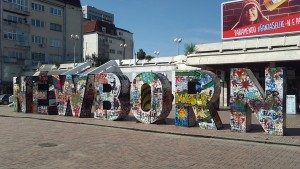 (Newborn references the new nation of Kosovo, interesting to note it is written in English)
(Newborn references the new nation of Kosovo, interesting to note it is written in English)
Two weeks ago we went to Kosovo. A territory very contested in terms of sovereignty. At it stands as of current, 111 countries of the 193 United Nations members (A little over 55%).
Among the countries that do not recognize Kosovo are Spain, Greece, Russia, as well as Serbia from whom the province of Kosovo gained independence. The countries who do not recognize Kosovo have their own intentions in doing so; as according to one of the talks held, some of the other nations which do not recognize its’ sovereignty have their own succession battles to fight ( such as the region of Catalonia within Spain), while others see themselves as having a loyalty to Serbia (Russia, Greece).
Not only is the situation of recognition extremely political, so is the wording of the entity, and the people composing the territory of Kosovo. Kosovo is deemed as a more neutral term, whereas Kosovo i Metohija denotes a more Serbian friendly approach to the issue, whereas referring to it as Kosova is more of a term used in secessionist rhetoric.
To fully understand the naming of the country, it’s important to look at the people that compose the territory of Kosovo. Most of the residents are Albanian, with a Serb minority (and other minorities composing less of the territory).
The subject of Kosovo is a very touchy one for most people in both Serbia, and Kosovo. There has been some progress, but it has been very lacking and slow. This was shown by our crossing into, and out of Kosovo. There was an agreement between Serbia and the territory to establish a border between the two, however since Serbia politically consider Kosovo a part of its territory you do not have to get your passport stamped on exiting Serbia or re-entering; on the other hand, your passport is to be stamped on entering Kosovo. If your passport is stamped and you leave from Serbia via airplane the Kosovo stamp itself gets nulled by a Serbian stamp over it.
The situation is complex, and seems to remain that way for a very long time, especially since Kosovo is facing its own internal conflicts among parliamentary members. Kosovo is stuck in a sort of temporal limbo and only time will tell how such a situation will change.
